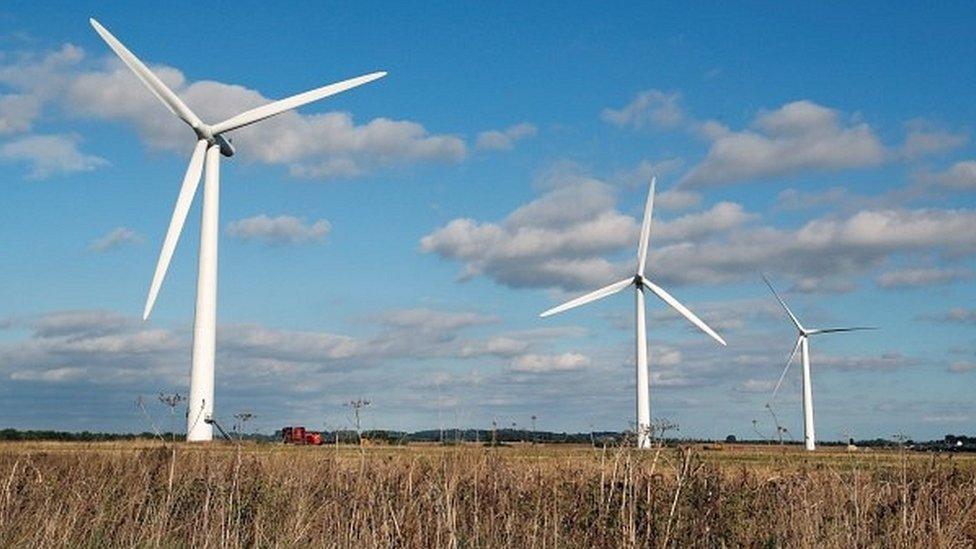Net zero announcement: Obstacles facing the UK government's plans
- Published

The government has laid out its plans to reduce emissions sharply by 2035 and take the UK towards being a zero carbon economy by 2050. These including more electric cars, planting trees and moving away from gas-powered central heating.
But what potential hazards are there ahead for ministers?
Tory sceptics
Some in the prime minister's own party doubt the economic arguments in favour of moving towards what they consider an over-reliance on renewable energy sources.
Conservative MP John Redwood asked in the House of Commons what would happen when the sun stopped shining and the wind stopped blowing. Another, Steve Baker, said a lot of "assumptions" were involved and asked that ministers carry out a "comprehensive audit" of their plans.

Tory MP: What happens when the wind doesn't blow?
Others are concerned about the cost to the general public, particularly those on lower incomes, and the impact that, in turn, may have on their chances at the next election.
Craig Mackinlay said it could become "electorally difficult" once people realised the plans "cost them money" or mean "a lifestyle that's not as convenient".
Given that the Conservatives have an 80-seat majority, this is unlikely to stop any plans becoming law, but if some of Mr Johnson's backbenchers are not persuaded, there could be some political turbulence.
Labour opposition
Shadow business secretary Ed Miliband was scathing in his response to the government's announcement, saying there was nothing like "the commitment we believe is required", in terms of investment, to cut greenhouse gas emissions.
Labour's commitment to borrow and invest £28bn per year in tackling climate change is a markedly different approach to the Conservatives. The Treasury has said borrowing heavily to cut greenhouse gases goes against the "polluter pays" principle and passes the costs on to future taxpayers.
It's not certain how this will play out in Parliament or whether this could become an important dividing line between the parties - and how it would play with voters.
Household costs
The Treasury accepts there will be an overall cost to achieving net zero emissions in the short term, but sources stress the cost of inaction would also be significant.
No overall figure is given but officials admit new taxes will be needed to recoup the revenue lost from the move away from petrol and diesel fuelled cars, for example.
The government raised £37bn from fuel duty and vehicle excise duty in the 2019-20 financial year, or about 1.7% of GDP.
A carbon tax could plug some of this, but the takings would dwindle as emissions fall, leaving a big shortfall.

How will voters feel if their bills go up to cover the costs?
In an assessment to go with the government's carbon-cutting plans, the Treasury said that "as with all economic transitions, ultimately the costs and benefits of the transition will pass through to households through the labour market, prices and asset values".
There is evidence of public support for stronger measures to tackle climate change, but if households end up having to spend a lot more money to go greener, there could be increased unease among voters that the government will not want ahead of a likely general election in the next couple of years.
In particular, it is feared this could go down badly in some of the former industrial areas of the the Midlands and northern England where the Conservatives made large gains from Labour in 2019.
"Any policies we bring in will be designed to be fair across the board," the PM's spokesman said.
COP26
One thing most governments agree on is that any effort to reduce emissions must be international if it is to succeed in limiting temperature rises.
With the COP26 climate summit in Glasgow fast approaching, Prime Minister Boris Johnson will hope his plan prompts other countries to make similar commitments and boost the chances of the UK brokering a renewed global effort to cut greenhouse gases.
If the world's biggest CO2 producers - including the US, China and India - reach an agreement it could ease domestic political pressures and allow him to claim more of an environmental "legacy".
US President Jo Biden and Indian PM Narendra Modi are attending COP26, but China's Xi Jinping is not thought likely to do the same.